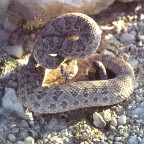- The Best Time of Day to Drink Bone Broth to Maximize Health Benefits
- 8 Ways to Increase Dopamine Naturally
- 7 Best Breads for Maintaining Stable Blood Sugar
- Gelatin vs. Collagen: Which is Best for Skin, Nails, and Joints?
- The Long-Term Effects of Daily Turmeric Supplements on Liver Health
- Could Your Grocery Store Meat Be Causing Recurring UTIs?
- Are You Making This Expensive Thermostat Error This Winter?
- Recognizing the Signs of Hypothyroidism
- 10 Strategies to Overcome Insomnia
- Could Artificial Sweeteners Be Aging the Brain Faster?
Don’t Let the Warm Weather Leave You Snakebitten


The arrival of warm weather means that snakes will be making their appearance, so you should take steps to prevent snakebites, an expert says.
The University of Alabama at Birmingham recently treated its first snakebite case of the season, noted Dr. Janyce Sanford, chair of the university’s department of emergency medicine.
“That is a usual pattern. As soon as the weather starts to warm up, snakes begin to get active and we begin seeing a bite or two. Still, we only see a few each spring, and people have a much greater chance of being stung by a bee or wasp or being bitten by a tick than being bitten by a snake,” Sanford said in a university news release.
If you’re in the woods or near rivers and creeks, keep an eye out for snakes and wear boots and long pants, she warned. It’s also a good idea to carry a cellphone.
“Get to an emergency department as quickly as you safely can, and that can often be accomplished by calling 911,” Sanford said. “Snap a picture of the snake with the cell phone if possible, but leave the snake behind. The last thing we need in a crowded emergency room is a snake, dead or alive.”
Emergency doctors do not need to see the snake that caused the bite. A large number of bites are dry — with no venom injected — or are from nonpoisonous snakes, Sanford noted. By monitoring the wound for a few hours, doctors can tell if venom is present, and appropriate antivenin can then be given to the patient.
Most snakebites are not fatal. Those at higher risk include the elderly, very young children and people with underlying medical problems, Sanford said.
More information
The U.S. National Library of Medicine has more about snakebites.
Source: HealthDay
Copyright © 2026 HealthDay. All rights reserved.










